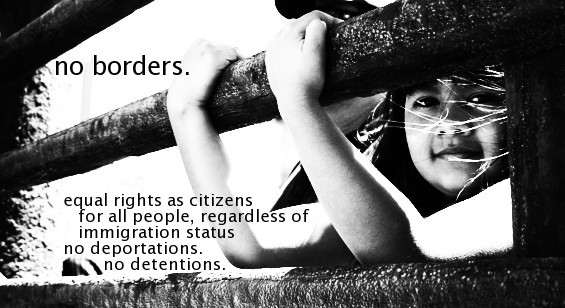Dr. Nadje Al-Ali March 14, 2007. Editor: Erik Leaver, IPS
Foreign Policy In Focus
Every-day survival is a priority in a context where lack of security goes side by side with incredibly difficult living conditions. The Iraqi infrastructure which was already severely debilitated as a result of economic sanctions and a series of wars has deteriorated even further since 2003. Electricity shortages, lack of access to potable water, malfunctioning sanitation systems and a deteriorating health system are part of every-day lives in post-2003 Iraq. Intisar K., who works as a doctor in a teaching hospital in Baghdad, summed up what has also been documented in several UN-related documents: “We only have electricity for three to a maximum of five hours a day. There is not enough clean drinking water. Lack of sanitation is a big problem and continues to be one of the main causes of malnutrition, dysentery and death amongst young children.”
(Click here to read more)
skip to main |
skip to sidebar







Vancouver - Occupied Coast Salish Territories noii-van@resist.ca / 604-682-3269 ext.7149 www.nooneisillegal.org

Blog Archive
-
▼
2007
(422)
-
▼
March
(64)
- International Statement: Secwepemc Native Youth Mo...
- Blacks and Immigrants: More Allies Than Adversaries
- Cops offer 'Don't Ask' policy
- Britain: Detainees Riot Over Bad Conditions
- The Iroquois Way of Impeachment
- Uranium and the War
- Labour Double-Standards Blamed for Farmworkers' De...
- CANADA: Counterinsurgency Manual Shows Military's ...
- US town tries to ban housing and employing non-sta...
- Bobby Seale Denied Entry to Canada
- Open Letter To The Anti-War Movement
- EcoWellness: Race and hazardous waste
- Deaths in Iraq Have Reached 1 Million
- Inuit Accuse US of Destroying Their Way of Life wi...
- Close to Slavery: Guestworker Programs in the Unit...
- Iraqi Women: Four years after the Invasion
- Jailing Immigrant Mothers in El Paso
- Mumia Addresses the World Death Penalty Conference
- Harassment 'endemic' in US forces
- Secrets and lies
- New Zealand: Images And Reality
- Time for a bi-national state
- The War On Sexism Has Yet To Be Won
- Canada Must Be Held Accountable For Haiti Coup
- Brazil's Ethanol Slaves
- UK Gulag: 940 detained since 9/11 without charge
- RAWA statement on the International Women's Day
- Palestine: Open Letter to the People of Six Nations
- Why Does The Times Recognize Israel's 'Right to Ex...
- The Iroquois Curse on Conrad Black – The “Silent” ...
- US Immigration System at its Worst
- Trials of Guantanamo suspects begin without a lawy...
- Ghana: 50 years since Independence
- War on Terror, War on Women
- Palestinian Refugees of Iraq
- Native Warriors Claim Responsibility for taking Ol...
- Board changes spark worries about refugees
- Police brutality mars Women’s Day Celebration in M...
- Rights Group Lashes U.S. on Status of Iraq Women
- Apartheid Comes to New Jersey
- Audit Finds Multiple Abuses in Immigration Jails
- International Women’s Day 2007: We Stand With The ...
- Reverse Reparations: Race, Place, and the Vicious ...
- Native Youth Movement Statement for Anti-Olympic C...
- Women's Fair Representation Looks Decades Away
- East Jerusalem residents face 'Kafkaesque bureaucr...
- Agencies hurting efforts to recognize foreign cred...
- Police go on trial over Katrina killings
- 50 Migrant Haitians missing after boat fire
- Iran: Left Opposition Speaks
- US: National ID Card Rules Unveiled
- Imminent Execution Of Iraqi Women
- S Korea: Fire in Detention Center Kills 9
- Political Prisoner Al-Arian Facing Deportation
- New Study: The Myth of Immigrant Criminality
- Inmates to Fill the Void in Farm Fields
- UN: One-third of Iraqis live in poverty
- US Economy Leaving Record Numbers in Severe Poverty
- Migrants as Globalization's Junk Mail
- Democracy Now! Immigration Stories
- Hersh: US Indirectly Funding Al-Qaeda Linked Sunni...
- The War on Terror and the Terror of War
- Case for Withdrawal from Afghanistan
- The Military Commissions Act, Gitmo Detainees and ...
-
▼
March
(64)
Labels
- Afghanistan (21)
- Africa (25)
- Anti-Oppression (15)
- Australia (8)
- Canada (105)
- Corporate Globalization (45)
- East Asia (9)
- Environment and Health (26)
- Europe (25)
- Gender (42)
- GLBTQ (7)
- Haiti (9)
- Immigrant/Refugee/Nonstatus (154)
- Imperialism (51)
- Incarceration (63)
- Indigenous (57)
- Iraq (54)
- Labour (34)
- Latin America (41)
- Media (3)
- Middle East (28)
- Palestine (42)
- Police Brutality (4)
- Poverty (17)
- Racism (58)
- Security (67)
- Somalia (7)
- South Asia (25)
- SPP (2)
- US Abroad (91)
- US Home (160)

About Us
No One is Illegal-Vancouver is a grassroots anti-colonial immigrant/refugee rights community collective with leadership from members of migrant and/or racialized backgrounds.
As a movement for self-determination that challenges the ideology of immigration controls, we are in full confrontation with Canadian border policies; denouncing and taking action to combat racial profiling, detention and deportation, the national security apparatus, law enforcement brutality, and exploitative working conditions of migrants. We stand in solidarity with indigenous struggles against colonization across Turtle Island and also place ourselves within the broader movement for global justice struggling against capitalism, homophobia, occupation, patriarchy, poverty, war, and other systems of oppression and exploitation.





No One Is Illegal - Vancouver
Our educational work involves furthering an anti-imperialist, anti-war, and anticapitalist analysis that links the "War on Terror" abroad to the racist "Fortress North America" at home. We struggle for the right for our communities to maintain their livelihoods and resist war, occupation, and displacement, while building alliances and supporting indigenous sisters and brothers fighting theft of land and displacement.
Our work is carried out through various strategies including public awareness events, direct support work with refugees and undocumented migrants, multilingual community political/legal forums, fighting back through rallies and direct actions, and ongoing campaigns and projects.